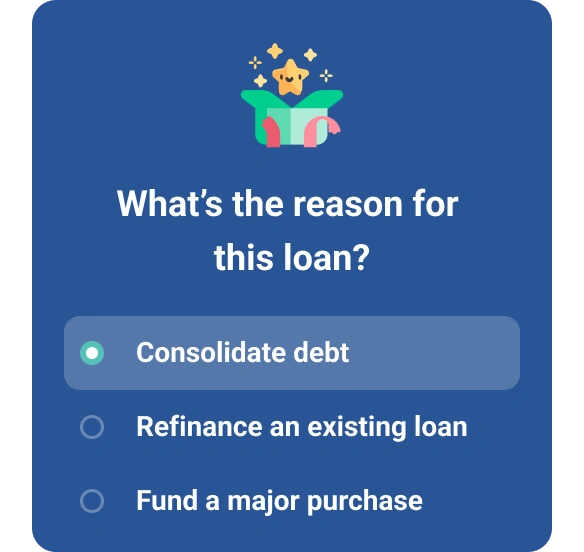What Is Debt Restructuring?
Quick Answer
Debt restructuring involves negotiating with creditors to reduce your interest rate, extend your loan term or cut your balance. It can make your debt more manageable through smaller monthly payments, lower interest rates or reducing how much you owe.

Debt restructuring involves negotiating with creditors to reduce your interest rate, extend your repayment term or cut your loan balance. If you're having trouble with your debt, debt restructuring can help make the situation more manageable.
The type of debt restructuring you need and can qualify for can vary depending on your situation, needs, goals and the type of debt you have. Here's what you need to know.
What Is Debt Restructuring?
Debt restructuring is the process of negotiating new terms with your creditors to make your debt more manageable. When you restructure debt, you work directly with lenders to modify aspects of your existing loans, such as lowering your interest rate, extending your repayment period or reducing the total amount owed.
This approach is worth considering if you're struggling to meet your current payment obligations but want to avoid default or bankruptcy. Debt restructuring can happen informally through direct negotiation with creditors or formally through legal proceedings like bankruptcy. The goal is to create a repayment plan that better fits your financial situation while allowing creditors to recover at least some of what they're owed.
Unlike taking out a new loan, debt restructuring involves modifying your existing agreements with your current lenders.
Debt Restructuring vs. Debt Consolidation
While these debt management strategies may sound similar, they work in distinctly different ways.
| Debt Restructuring | Debt Consolidation | |
|---|---|---|
| Purpose | Modify existing loan terms with current creditors | Combine multiple debts into one new loan |
| Cost over time | May reduce total interest paid through lower rates or reduced principal | Depends on new loan terms and fees |
| Credit impact | Varies; may show as modified terms or partial payments | Can improve credit if managed well; hard inquiry initially |
| Best for | Borrowers facing financial hardship who want to avoid default | Those with good credit seeking simplified payments |
How Do You Restructure Debt?
There are a few different ways you can restructure debt, but all of them involve communicating with your creditors about your financial situation and exploring your options.
Regardless of which debt restructuring method you pursue, the process begins with open communication with your creditors. You'll need to explain your financial situation honestly and discuss what changes would make your debt more manageable.
If you're considering working with a debt relief company that contacts you by phone, be aware that advance fees are banned under the FTC's Telemarketing Sales Rule. Legitimate telemarketing debt relief services cannot charge you before they settle or reduce your debt. If a company demands payment upfront, it's a red flag for potential fraud. Also, debt relief companies can't do anything for you that you can't do yourself for free.
Here are some common options for restructuring debt.
Loan Modification
A loan modification involves the creditor changing the terms of the loan, which can include your monthly payment amount, the interest rate or the repayment term. Each of these can help make your payments more affordable while you work toward getting back on your feet financially.
Loan Repayment Agreement
You may be able to negotiate a formal or informal repayment agreement with your creditor. An informal agreement doesn't change the original repayment terms but allows you to get a new repayment plan, at least for a predetermined period of time.
For example, the lender may keep your loan balance and interest rate the same, but allow you to make reduced payments for a few months.
With a formal repayment agreement, you're getting a new repayment plan, but you're also signing a legally binding contract.
Debt Settlement
Debt settlement allows you to get rid of the debt by paying less than what you owe, typically with a lump-sum payment.
You can try to negotiate a settlement on your own for free or enlist the help of a debt settlement company or law firm. While they can save you from having to do all the legwork yourself, there's no guarantee they'll get you a better deal, and they often charge fees equal to 15% to 25% of the original debt amount. Additionally, you could be on the hook for taxes on the forgiven debt.
Can Debt Restructuring Hurt Your Credit?
Your payment history is the most influential factor in your FICO® ScoreΘ, and because debt restructuring indicates that you can't repay the loan as you originally agreed to, it could impact your credit history negatively.
How much it will impact your credit, however, will depend on the type of debt restructuring you choose. Here's what to keep in mind:
- Temporary modifications will have minimal impact. If your lender agrees to temporarily adjust your monthly payment or interest rate without changing the overall loan terms, it may not affect your credit score at all.
- Your score may already be in poor shape. If you're considering debt restructuring, your credit score may have already sustained damage from the missed payments leading up to this point. As a result, restructuring could have a less pronounced effect than earlier missed payments did.
- Debt settlement can cause significant damage. Agreeing to a debt settlement will likely damage your credit significantly and remain on your credit reports for seven years from the original delinquency date. However, if your credit is already in bad shape, it may still be worth it.
- It's better than bankruptcy or foreclosure. While debt restructuring can negatively impact your credit score, it's generally still preferable to the severe credit damage and stress caused by bankruptcy or foreclosure.
Learn more: What Affects Your Credit Scores?
Pros and Cons of Debt Restructuring
Because debt restructuring can impact your financial security now and in the future, it's critical that you carefully weigh the benefits and drawbacks before moving forward. Here's what to keep in mind.
Pros
-
Helps you avoid default or bankruptcy: Restructuring allows you to work with your creditors to create a more manageable repayment plan, which can help you avoid more serious consequences like loan default, collections, bankruptcy or foreclosure.
-
Makes payments more affordable: Whether you reduce your interest rate, lower your monthly payment or extend your repayment term, debt restructuring can ease the financial pressure you're facing.
-
May preserve your relationship with creditors: Working proactively with your lender shows good faith and may make it easier to work with that financial institution in the future.
Cons
-
Can damage your credit score: Depending on how your debt is restructured, the lender may report the changes to the credit bureaus, which could hurt your credit.
-
May increase your total costs: If you opt to extend your repayment term to get lower monthly payments, it'll likely result in more interest charges over the life of the loan. Also, if you're thinking of pursuing debt settlement, you'll need to account for fees and taxes.
-
Approval isn't guaranteed: Creditors aren't required to work with you or accept your proposal to restructure your debt.
Is Debt Restructuring a Good Idea?
Debt restructuring can be a smart solution if you're facing temporary financial difficulties and want to avoid default or bankruptcy. It works best if your current payments are unmanageable, but you have a steady income, or you expect to have one in the near future.
The key is to act early, preferably before you start missing payments or receiving collection calls.
That said, restructuring may not be worth pursuing if your debt is minimal or you can manage your payments better with budgeting adjustments.
Warning: Any debt that's forgiven through restructuring may be considered taxable income by the IRS. If a creditor forgives $600 or more, you'll receive a 1099-C form to report it on your tax return. But even if the forgiven amount is below that threshold, you'll still need to report it.
What Are Alternatives to Debt Restructuring?
Depending on your situation and credit history, you may have access to other options you can explore before trying to negotiate with a lender.
Debt Consolidation
Debt consolidation involves using a debt consolidation loan or balance transfer credit card to consolidate high-interest credit card balances.
In addition to simplifying your budget by combining your monthly payments into one, it can also help you save money with a lower interest rate. And if you pick a personal loan, you'll have a fixed repayment term instead of a low minimum monthly payment and no set repayment schedule.
That said, debt consolidation typically only makes sense if you have good credit. Otherwise, you may not get an interest rate that's low enough to make the process worth it.
Refinancing
If you have a mortgage loan, student loan or auto loan, refinancing may be able to help you get a lower interest rate or longer repayment period, each of which can reduce your monthly payment.
Like debt consolidation, though, you'll have a better chance of getting a low interest rate if you have good or excellent credit. Also, note that some lenders, particularly mortgage lenders, charge upfront fees that could eat into your potential savings.
Forbearance
Whether you've already missed a payment or two or you're worried about missing your first, consider contacting your lender about forbearance options. Forbearance allows you to pause your monthly payments for at least a month or two while you get back on track.
Forbearance doesn't require a credit check, but because it usually only provides short-term relief, it may not be the right move if you don't anticipate your financial situation changing anytime soon.
Debt Management Plan
Instead of trying to negotiate directly with your lender, you may be able to enlist the help of a credit counseling agency. These agencies typically work with unsecured debt, such as credit card balances, and can negotiate lower interest rates and monthly payments, reduced fees and more with your creditors.
There's no credit score requirement to qualify, but there are usually modest upfront and monthly fees, and you'll likely need to close your credit card accounts for the three-to-five-year debt management plan.
Bankruptcy
Filing for bankruptcy is never ideal, but if you have no other options, including debt restructuring, it may be your last resort.
Bankruptcy can allow you to get on a reorganized repayment plan with your creditors or wipe out your debt altogether after liquidating some of your assets, giving you a fresh start.
That said, a bankruptcy filing can remain on your credit reports for up to 10 years and make it difficult to get approved for credit for a while, so think carefully and consult with a credit counselor and bankruptcy attorney before you proceed.
Frequently Asked Questions
Monitor Your Credit Throughout the Process
Regardless of how you plan to tackle your debt, it's important to keep an eye on your credit score throughout the process. With Experian's free credit monitoring service, you can get access to your FICO® Score and Experian credit report, plus real-time alerts when changes are made to your credit report.
This service can make it easy for you to understand how your actions impact your credit and to spot potential issues as they come up, so you can address them quickly.
Find out what debts you owe
Your free credit report lists all your debts, such as credit card balances and loans, helping you create a plan to tackle your debt and improve your financial health.
Review your creditAbout the author
Ben Luthi has worked in financial planning, banking and auto finance, and writes about all aspects of money. His work has appeared in Time, Success, USA Today, Credit Karma, NerdWallet, Wirecutter and more.
Read more from Ben

